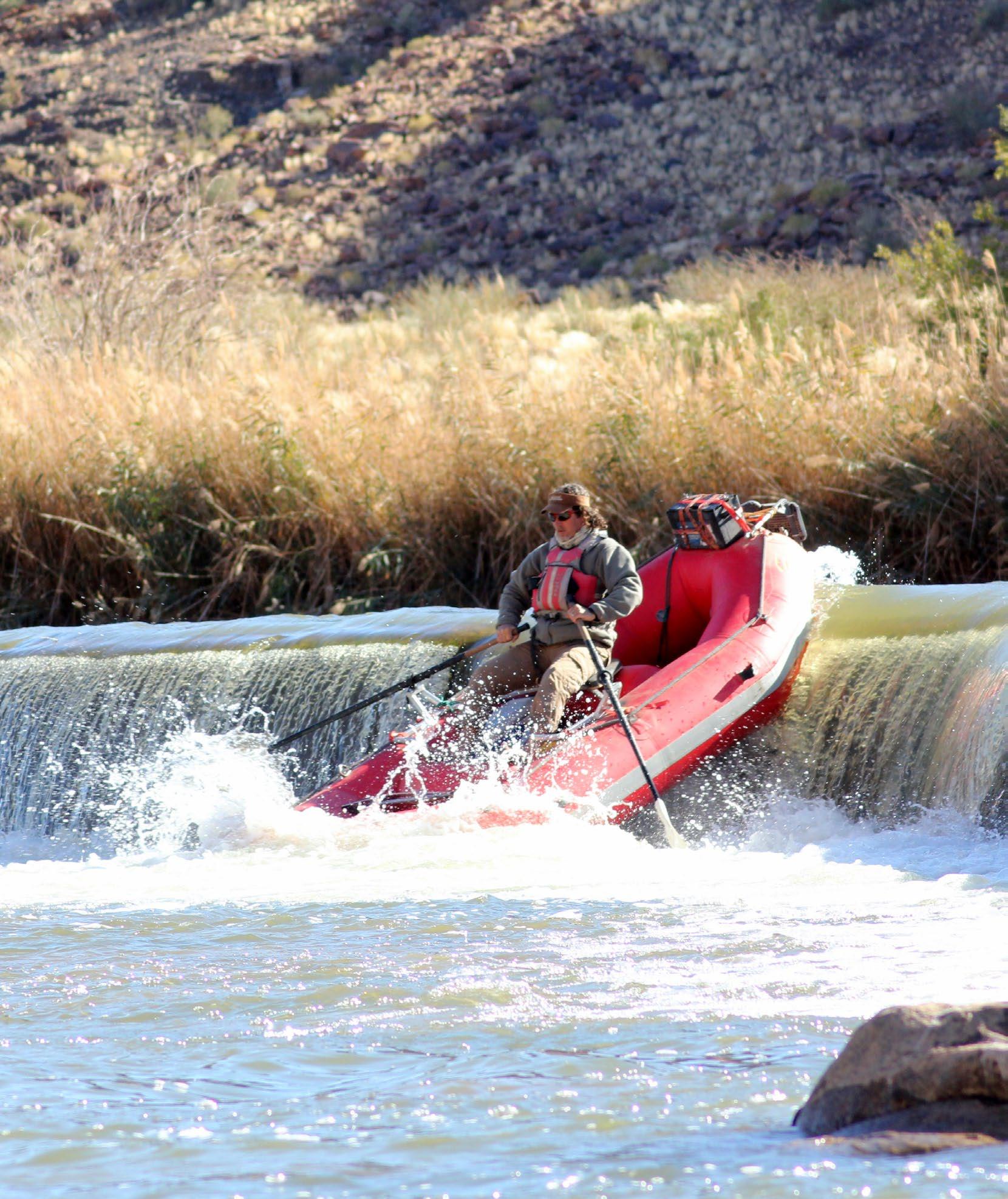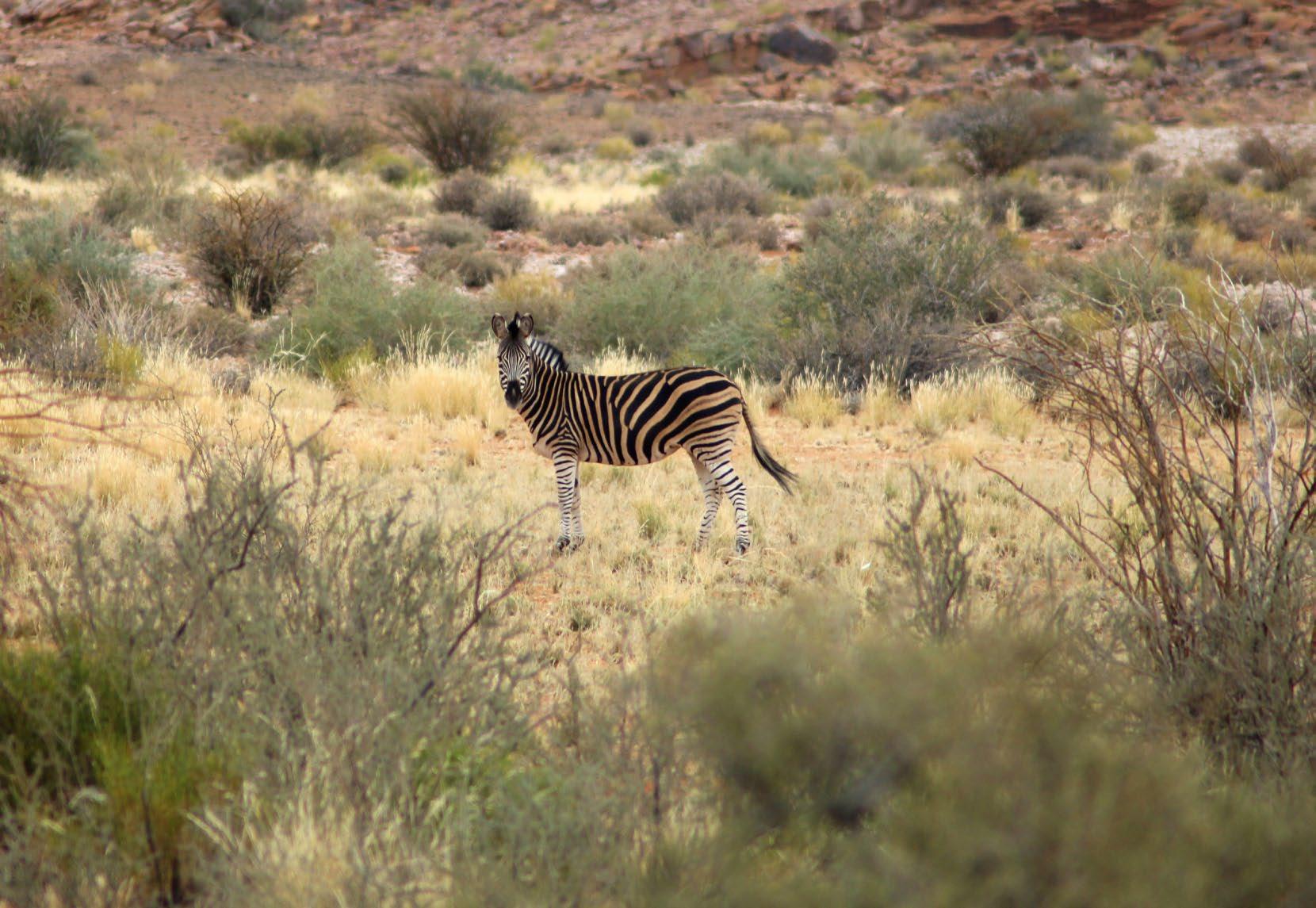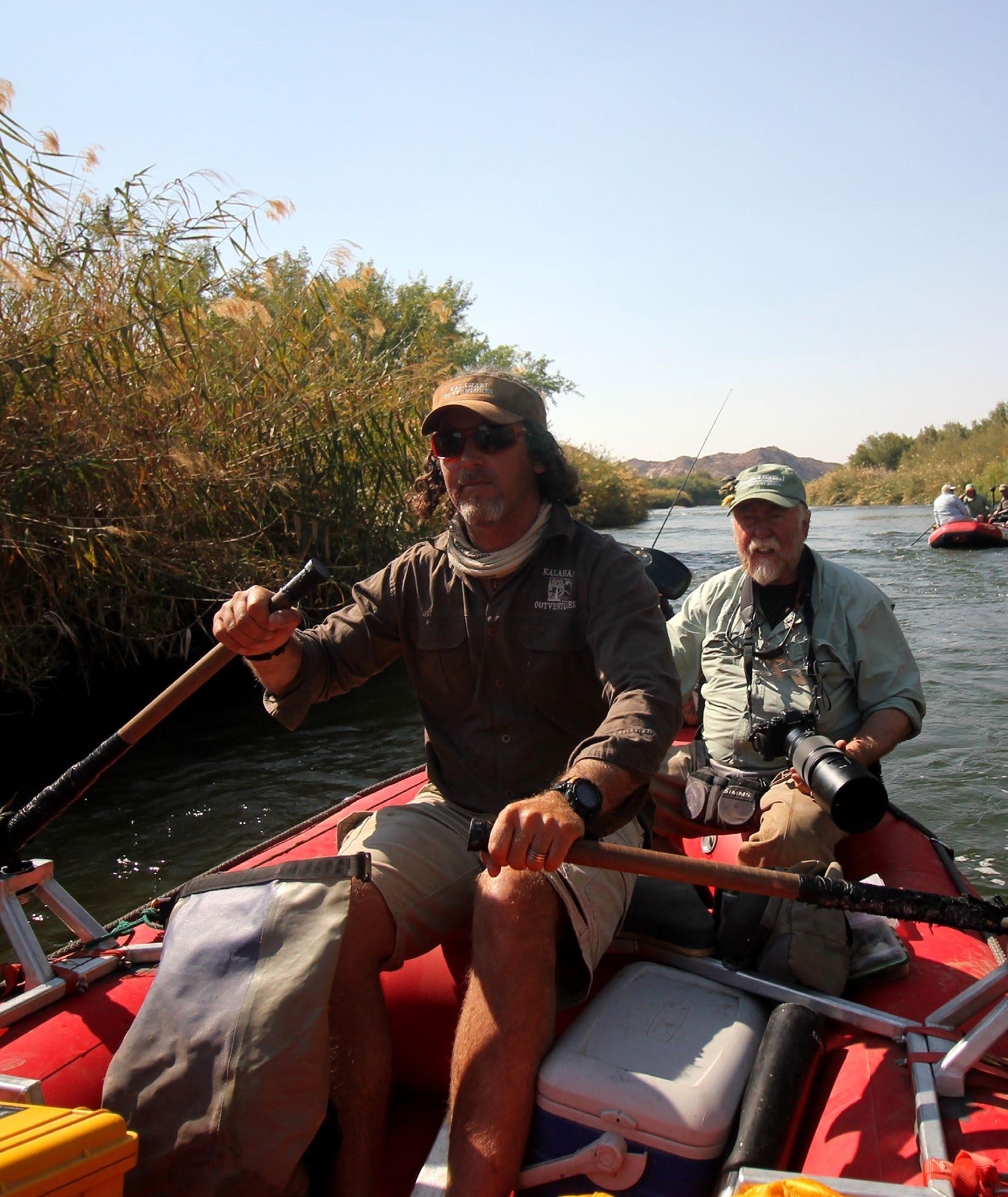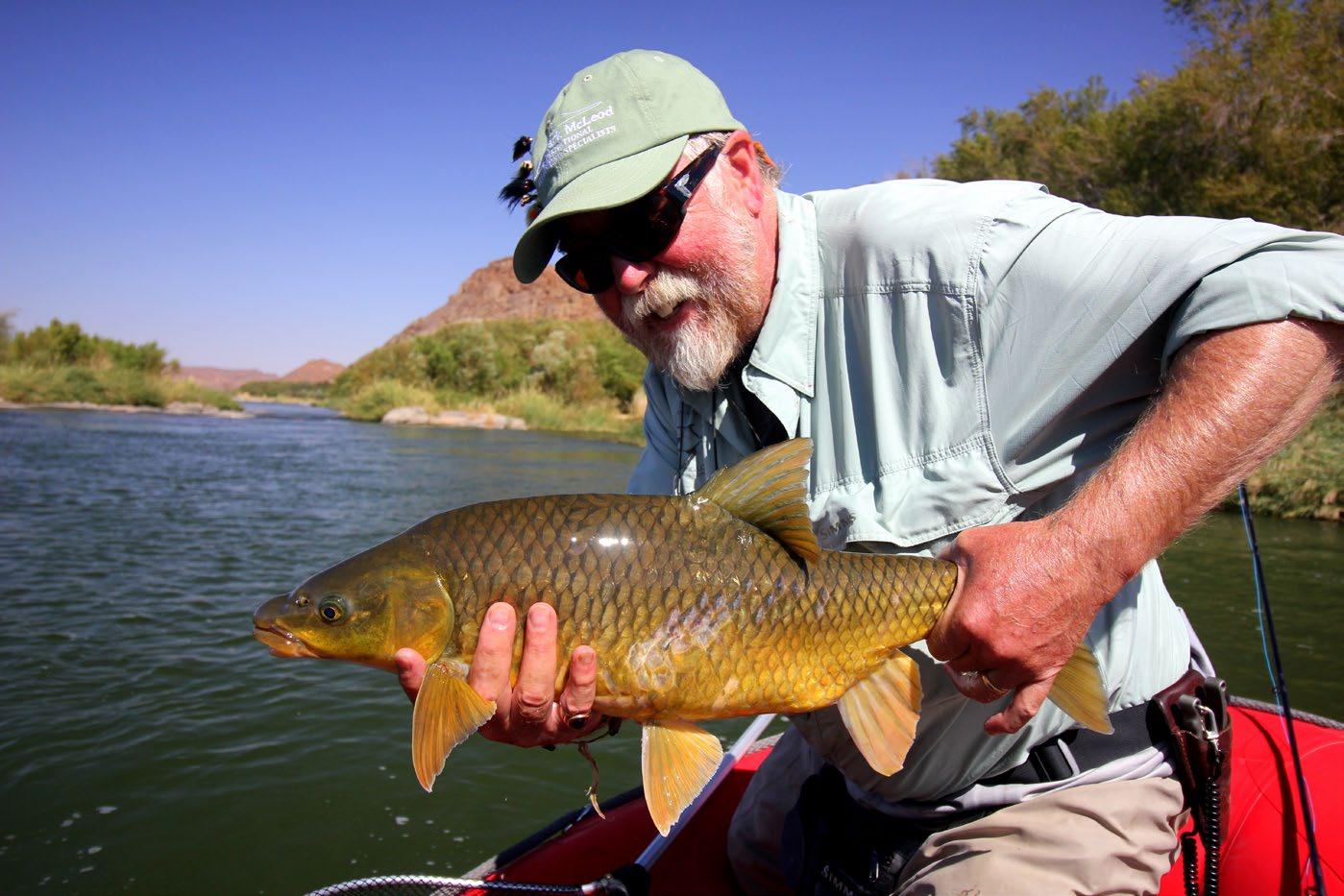
11 minute read
South Africa: A Kalahari Adventure
Africa has always seemed like a long way away to me. As someone who plans nearly all of their movements around where and when the fishing is good, I have never really pictured the continent as high up on my list. Of course, there is the well-documented and fierce tigerfish as well as a very prolific saltwater fishery but nothing had made me take the leap…until now.
By ALEX JARDINE
I had read and seen various accounts of fishing for yellowfish over the years and I must admit they did gain some of my interest, but I very much felt that they were a species that the South African’s targeted as a replacement for trout… how wrong I was. In 2016, one of our good friends, Garth Wellman, first told us of this little-known but potentially world class destination in South Africa’s Northern Cape for largemouth yellowfish.

You, like I did, are probably thinking that a yellowfish is a yellowfish but there are in fact quite a lot of subspecies, each with their own unique characteristics. The smallmouth yellowfish is the most well documented of the species, it is an avid nymph and dry fly eater and is generally about 1 – 3 lbs in weight. The largemouth, however, are surrounded with more mystery.
They are not readily accessible in southern Africa due to their specific habitat requirements, often looking for deep holes with lots of structure and plenty of baitfish. They are aggressive fish eaters, and unlike their more carp-like brethren, they take on a much more mahseer-like appearance with a flat and forward facing mouth combined with their eyes on the top of their head to help them hunt in low light conditions.

Garth, and Craig, had briefed us that it was possible to catch good numbers of smaller smallmouth in the fast water on nymphs in the Northern Cape but what really made this place special was the big streamer-eating fish in the slow deep pools. As I secretly enjoy fishing streamers and baitfish patterns this grabbed my attention immediately and I set up station at my vice to prepare for the relative unknown…
With feather and fur strapped to hooks and bags packed it was soon time to leave the warm August sunshine in the UK for the South African winter. Africa and winter, you may not think all that much of it but I must recommend that you pack a woolly hat and warm socks. Whilst the day time temperatures were as hot as any summer’s day in the UK, the night time plunged into single figures and some extra warmth was often very welcome.


We were greeted by our guides, Craig and Matt, and the camp crew that would be with us for the week, West, Eric, William and Anton. The bags were deposited in our rooms and welcome drinks were ready and waiting at the bar. That evening the usual buzz filled the air, stories of previous trips, judging of flies tied and the anticipation for what lay ahead of us. We enjoyed a wonderful braai around a camp fire under a canopy of stars before grabbing a few hours’ sleep.
I usually struggle to sleep in on fishing trips, never wanting to miss a moment of daylight or the beautiful golden hours of sunrise and sunset. I was no different here, waking up at about 0530, I found my way to the hot coffee and waited outside for the bleeding hot orange of the horizon to take over from the expanse of midnight blue. As daylight began to take a hold it was possible to see fleeting springbok move from grass tussock to bush.

We wolfed down breakfast and more coffee before loading our kit on to a safari-style Land Rover and beginning our 20-30 minute journey to the river. The accommodation and river access is all part of a large game reserve and leopard protection area, this makes for a very unique and wonderful commute to the river.
On this first morning we saw numerous springbok, a gemsbok and a lone giraffe as well as numerous birds and raptors. For what is at first quite desolate in appearance soon springs to life. As you approach the river the plains scrub turns into a rich vein of trees and shrubs with the chorus of various birds audible over the babbling water.

Our set up on this first day was 7 and 8 weight rods matched with Airflo 40+ Di5 sinking lines and 8-10 ft leaders with a 13-15 lbs tippet. For starters, Craig and Matt advised us to fish with heavier black streamer patterns. They assured us that these are good for searching for fish and only once you find a shoal that you then start trying different colours and sizes. Now all set-up, Ronnie and I headed out with Matt guiding us and Charlotte and Gordon headed downstream with Craig.


The day can only be described as one of two halves, the morning was fresh and sunny but the afternoon whilst still sunny buffeted us with a fierce and cool easterly wind which made for tough fishing conditions. Despite this we were all able to hook a fish or two and feel a few takes. I found the takes very odd on this first day, they were not like the big hits that the Montana trout give you but far more hesitant, almost like a salmon just nipping at the tail strands.
Both Matt and Craig put this down to the unusual low pressure system that had passed through the area just before we arrived. They hoped with some settled weather that we would begin to feel some proper takes in the coming days.

Charlotte took honours for the day with a nice largemouth yellowfish of about 4 lbs and we landed three smallmouth yellowfish between 3 – 4 lbs. Ronnie was the unfortunate angler with the ‘one that got away’ story as he hooked into what appeared a good fish only for it to stay deep before the hooked pulled. With our appetite whetted it was time to begin our float trip. The real world hustle and bustle was soon forgotten as we putted the rafts down the river and into the wilderness that divides South Africa and Namibia.
To journey along the Orange River here is to see how rich in life it is, the trees grow thick, catfish and carp leap from the water, and kingfishers, cormorants and herons pursue their prey from most rocky outcrops. It is truly an overload on the senses, as birds skip and flutter in all directions, baboon shouts ring up and down the valley, the flowering plants offer a subtle fragrance to the banksides and the sun begin to warm the still chilly breeze.

The landscape is full of interest, Red sandstone and granite cliffs guide the river along its path. Dry river beds from floods bygone carve their way to the river offering animal drinking spots and the pools are broken up and split into channels by sand and bedrock islands.

The guides worked the boats using anchors and the oars to hold the rafts in position so that you can target rock drop-offs, deep undercut banks and bed rock shelves. Over the course of our trip we really began to get an understanding of where these fish could be found, the biggest restraint was having the confidence to fish the fly properly. Both the largemouth and larger smallmouth yellowfish were found in deep water, close to the bottom but also tight against a structure.
The casts were often made at the structure and then a series mends were made in order to hold the fly in position and give the line and fly time to sink to the correct depth. The fishing trip had started slowly with a few taps here and there and only a few largemouth and smallmouth landed, but our luck began to pick up as we descended down more rapids and lower down the river.

It was our changing fortunes that led me to hook a fish that will haunt me for years to come, this time the line was almost ripped out of my hands. The fish then ran straight for us, and I rushed to gather up my loose line and get the fish under control on the reel. Now on the reel the fish felt the extra tension and this time took off downstream to take residence behind a rock midstream.
Pausing only briefly, it then went on a searing run for about 20 yards. There was no chance of turning this fish, or stopping it in its tracks and then I felt it go through weed and the line run along rocks. My heart sank at this point, knowing I was now facing a losing battle I hung on in hope. Sure enough, the line frayed and broke and I was left crushed and beaten in the back of the boat. We never saw the fish so cannot say for sure how big it was but with knowledge that the largemouth exceed 20 lbs here and there is belief that they may even exceed 30 lbs it was easy for the mind to wander…

Never one to take losing a fish too well, I sat in the back of the boat with a cold Windhoek beer and watched the river pass by. As the sun began to dip behind the jagged horizon the temperature began to fall and we pushed on to our campsite.
The campsite was already set up and the glow of a warming campfire welcomed us in. The camp was on a large beach, made up of small stones and millions of shells from the large population of crustaceans in the river, it was more akin to a seaside beach than a river. Four spacious tents were set up with plenty of room for two people to share. A seating area around one campfire and a second campfire for cooking. That night the sky burnt red before giving way to an incredible star display. Whilst the temperature plummeted to single figures the tents were comfortable and it was so easy to fall asleep with the stars glinting through the tent windows.

Rising early to the crackling fire and dim pre-dawn light was much easier here. It was a new day and there were more fish to catch. Breakfast was a simple spread of cereals, yogurts and rusk (best to dunk these in your coffee, unless you want to break your teeth!). Whilst eating, the camp hands set up a catfish rod with bait to see if we couldn’t find one of the many big fish that reside in the river. The set up was a simple heavy duty spinning rod, fixed spool reel, weight and a hefty chunk of one of the many mudfish from the river. It wasn’t long before we had action with a nice fish of around 20 lbs landed during breakfast.
With the loss now firmly behind me, we floated on down the river and the largemouth and smallmouth yellowfish began to grace the net with far more frequency. The takes were far more confident and the fish were clearly more active as the weather began to stabilise. Both Largemouth and Smallmouth averaged 4-6 lbs and fish over 8 lbs were common.

On the final day, after several missed takes I had to have a stern word with myself to pull it together and make the next take count. As we drifted into a pool called ‘Last Chance Saloon’, we could see the prime spot. It took a while to get the cast in the right zone but then I fired a cast across. Immediately you knew it was in the right place, I made some mends in order to get the fly down. As I felt the fly sinking I could feel the line draw tight, not like a snag but different. I firmly strip set the hook and knew that I had got it right.
The fish took off into the pool and tried to dig deep. Now that my fish was away from the zone my boat partner was able make another cast. As my fish approached the net I look over to see that he has also hooked into a fish. After a few minutes we had both fish sat in our net. They were good fish and remarkably similar in size. When weighed they both clocked the scales at 12 lbs, it was a fantastic moment. Not quite the last cast but a wonderful way to round off a brilliant fishing trip.
Over the course of our four and a half days fishing we landed 25 smallmouth to just under 10 lbs and 25 largemouth to 18 lbs between four of us. Whilst this was considered a tough week of fishing, we were delighted with our efforts but at the back of my mind that fish that got away is still lingering… I must go back.







